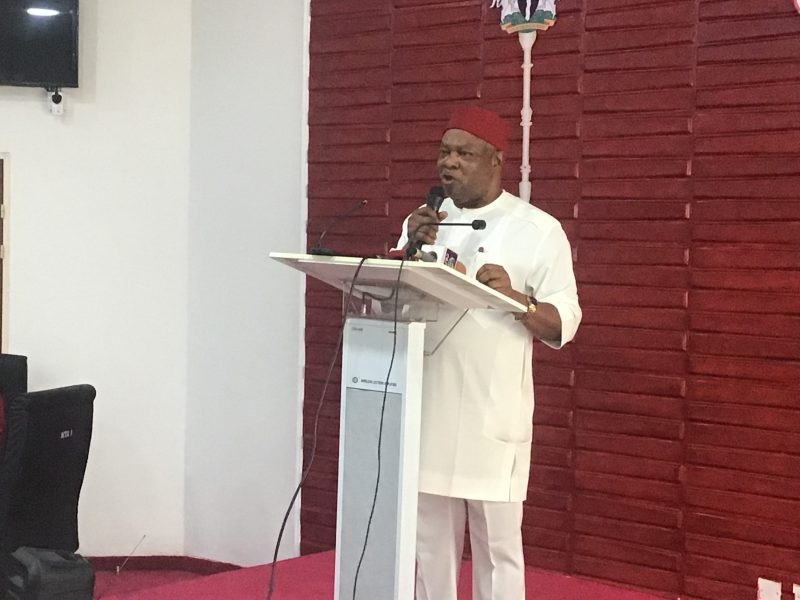To address issues such as brain drain and other issues facing Universities, the Nigerian Senate has demanded that the 2025 budget provide higher funding for Universities
This came after a motion that was adopted on Tuesday in plenary.
Senator Ani Anthony (APC-Ebonyi) was the sponsor of the motion, which was titled “Urgent Need to Address Challenges of Increasing Cases of Brain Drain in the Nigerian University System.”
In his motion, Senator Ani stated that a considerable number of highly educated professionals from Nigeria had left the country over the years, particularly in the academic sector, in search of better working conditions.

According to him, “this worsened the skill gap in the workforce and is capable of hindering economic growth and development of the country.”
Senator Ani said that “the National Universities Commission (NUC) report indicated that many Nigerian universities operate with less than 50 per cent of the required academic staff.”
He expressed worry that the remunerations of the Nigerian university lecturers was among the poorest in the world, and it was last reviewed over 15 years ago.
This, he said cannot meet the current economic realities of the country.
The Lawmaker lamented that many universities in other Western African countries have better working conditions than what was obtainable in the Nigerian university system.
He emphasized that the brain drain problem in Nigeria should be a source of concern since it threatens the sustainability of the country’s higher education, notably in engineering, medicine, and science.
Senator Ani said the sectors were vital to the country’s socioeconomic development.
However, in its other resolution, the Senate directed the Committee on Tertiary Education and TETFUND to coordinate with relevant government agencies and devise strategies to combat the epidemic of brain drain in Nigerian universities.
Senate President Godswill Akpabio in his remarks said all hands must be on deck to proffer solutions to issue of brain drain, as a matter of concern in the nation’s tertiary education.
Senator Akpabio said that “the reasons for brain drain was basically economic in nature.”
He expressed believe that a review of the emolument of personnel in tertiary institutions would help mitigate the brain drain issue.
To address issues such as brain drain and other issues facing Universities, the Nigerian Senate has demanded that the 2025 budget provide higher funding for Universities
This came after a motion that was adopted on Tuesday in plenary.
Senator Ani Anthony (APC-Ebonyi) was the sponsor of the motion, which was titled “Urgent Need to Address Challenges of Increasing Cases of Brain Drain in the Nigerian University System.”
In his motion, Senator Ani stated that a considerable number of highly educated professionals from Nigeria had left the country over the years, particularly in the academic sector, in search of better working conditions.

According to him, “this worsened the skill gap in the workforce and is capable of hindering economic growth and development of the country.”
Senator Ani said that “the National Universities Commission (NUC) report indicated that many Nigerian universities operate with less than 50 per cent of the required academic staff.”
He expressed worry that the remunerations of the Nigerian university lecturers was among the poorest in the world, and it was last reviewed over 15 years ago.
This, he said cannot meet the current economic realities of the country.
The Lawmaker lamented that many universities in other Western African countries have better working conditions than what was obtainable in the Nigerian university system.
He emphasized that the brain drain problem in Nigeria should be a source of concern since it threatens the sustainability of the country’s higher education, notably in engineering, medicine, and science.
Senator Ani said the sectors were vital to the country’s socioeconomic development.
However, in its other resolution, the Senate directed the Committee on Tertiary Education and TETFUND to coordinate with relevant government agencies and devise strategies to combat the epidemic of brain drain in Nigerian universities.
Senate President Godswill Akpabio in his remarks said all hands must be on deck to proffer solutions to issue of brain drain, as a matter of concern in the nation’s tertiary education.
Senator Akpabio said that “the reasons for brain drain was basically economic in nature.”
He expressed believe that a review of the emolument of personnel in tertiary institutions would help mitigate the brain drain issue.
To address issues such as brain drain and other issues facing Universities, the Nigerian Senate has demanded that the 2025 budget provide higher funding for Universities
This came after a motion that was adopted on Tuesday in plenary.
Senator Ani Anthony (APC-Ebonyi) was the sponsor of the motion, which was titled “Urgent Need to Address Challenges of Increasing Cases of Brain Drain in the Nigerian University System.”
In his motion, Senator Ani stated that a considerable number of highly educated professionals from Nigeria had left the country over the years, particularly in the academic sector, in search of better working conditions.

According to him, “this worsened the skill gap in the workforce and is capable of hindering economic growth and development of the country.”
Senator Ani said that “the National Universities Commission (NUC) report indicated that many Nigerian universities operate with less than 50 per cent of the required academic staff.”
He expressed worry that the remunerations of the Nigerian university lecturers was among the poorest in the world, and it was last reviewed over 15 years ago.
This, he said cannot meet the current economic realities of the country.
The Lawmaker lamented that many universities in other Western African countries have better working conditions than what was obtainable in the Nigerian university system.
He emphasized that the brain drain problem in Nigeria should be a source of concern since it threatens the sustainability of the country’s higher education, notably in engineering, medicine, and science.
Senator Ani said the sectors were vital to the country’s socioeconomic development.
However, in its other resolution, the Senate directed the Committee on Tertiary Education and TETFUND to coordinate with relevant government agencies and devise strategies to combat the epidemic of brain drain in Nigerian universities.
Senate President Godswill Akpabio in his remarks said all hands must be on deck to proffer solutions to issue of brain drain, as a matter of concern in the nation’s tertiary education.
Senator Akpabio said that “the reasons for brain drain was basically economic in nature.”
He expressed believe that a review of the emolument of personnel in tertiary institutions would help mitigate the brain drain issue.
To address issues such as brain drain and other issues facing Universities, the Nigerian Senate has demanded that the 2025 budget provide higher funding for Universities
This came after a motion that was adopted on Tuesday in plenary.
Senator Ani Anthony (APC-Ebonyi) was the sponsor of the motion, which was titled “Urgent Need to Address Challenges of Increasing Cases of Brain Drain in the Nigerian University System.”
In his motion, Senator Ani stated that a considerable number of highly educated professionals from Nigeria had left the country over the years, particularly in the academic sector, in search of better working conditions.

According to him, “this worsened the skill gap in the workforce and is capable of hindering economic growth and development of the country.”
Senator Ani said that “the National Universities Commission (NUC) report indicated that many Nigerian universities operate with less than 50 per cent of the required academic staff.”
He expressed worry that the remunerations of the Nigerian university lecturers was among the poorest in the world, and it was last reviewed over 15 years ago.
This, he said cannot meet the current economic realities of the country.
The Lawmaker lamented that many universities in other Western African countries have better working conditions than what was obtainable in the Nigerian university system.
He emphasized that the brain drain problem in Nigeria should be a source of concern since it threatens the sustainability of the country’s higher education, notably in engineering, medicine, and science.
Senator Ani said the sectors were vital to the country’s socioeconomic development.
However, in its other resolution, the Senate directed the Committee on Tertiary Education and TETFUND to coordinate with relevant government agencies and devise strategies to combat the epidemic of brain drain in Nigerian universities.
Senate President Godswill Akpabio in his remarks said all hands must be on deck to proffer solutions to issue of brain drain, as a matter of concern in the nation’s tertiary education.
Senator Akpabio said that “the reasons for brain drain was basically economic in nature.”
He expressed believe that a review of the emolument of personnel in tertiary institutions would help mitigate the brain drain issue.
To address issues such as brain drain and other issues facing Universities, the Nigerian Senate has demanded that the 2025 budget provide higher funding for Universities
This came after a motion that was adopted on Tuesday in plenary.
Senator Ani Anthony (APC-Ebonyi) was the sponsor of the motion, which was titled “Urgent Need to Address Challenges of Increasing Cases of Brain Drain in the Nigerian University System.”
In his motion, Senator Ani stated that a considerable number of highly educated professionals from Nigeria had left the country over the years, particularly in the academic sector, in search of better working conditions.

According to him, “this worsened the skill gap in the workforce and is capable of hindering economic growth and development of the country.”
Senator Ani said that “the National Universities Commission (NUC) report indicated that many Nigerian universities operate with less than 50 per cent of the required academic staff.”
He expressed worry that the remunerations of the Nigerian university lecturers was among the poorest in the world, and it was last reviewed over 15 years ago.
This, he said cannot meet the current economic realities of the country.
The Lawmaker lamented that many universities in other Western African countries have better working conditions than what was obtainable in the Nigerian university system.
He emphasized that the brain drain problem in Nigeria should be a source of concern since it threatens the sustainability of the country’s higher education, notably in engineering, medicine, and science.
Senator Ani said the sectors were vital to the country’s socioeconomic development.
However, in its other resolution, the Senate directed the Committee on Tertiary Education and TETFUND to coordinate with relevant government agencies and devise strategies to combat the epidemic of brain drain in Nigerian universities.
Senate President Godswill Akpabio in his remarks said all hands must be on deck to proffer solutions to issue of brain drain, as a matter of concern in the nation’s tertiary education.
Senator Akpabio said that “the reasons for brain drain was basically economic in nature.”
He expressed believe that a review of the emolument of personnel in tertiary institutions would help mitigate the brain drain issue.
To address issues such as brain drain and other issues facing Universities, the Nigerian Senate has demanded that the 2025 budget provide higher funding for Universities
This came after a motion that was adopted on Tuesday in plenary.
Senator Ani Anthony (APC-Ebonyi) was the sponsor of the motion, which was titled “Urgent Need to Address Challenges of Increasing Cases of Brain Drain in the Nigerian University System.”
In his motion, Senator Ani stated that a considerable number of highly educated professionals from Nigeria had left the country over the years, particularly in the academic sector, in search of better working conditions.

According to him, “this worsened the skill gap in the workforce and is capable of hindering economic growth and development of the country.”
Senator Ani said that “the National Universities Commission (NUC) report indicated that many Nigerian universities operate with less than 50 per cent of the required academic staff.”
He expressed worry that the remunerations of the Nigerian university lecturers was among the poorest in the world, and it was last reviewed over 15 years ago.
This, he said cannot meet the current economic realities of the country.
The Lawmaker lamented that many universities in other Western African countries have better working conditions than what was obtainable in the Nigerian university system.
He emphasized that the brain drain problem in Nigeria should be a source of concern since it threatens the sustainability of the country’s higher education, notably in engineering, medicine, and science.
Senator Ani said the sectors were vital to the country’s socioeconomic development.
However, in its other resolution, the Senate directed the Committee on Tertiary Education and TETFUND to coordinate with relevant government agencies and devise strategies to combat the epidemic of brain drain in Nigerian universities.
Senate President Godswill Akpabio in his remarks said all hands must be on deck to proffer solutions to issue of brain drain, as a matter of concern in the nation’s tertiary education.
Senator Akpabio said that “the reasons for brain drain was basically economic in nature.”
He expressed believe that a review of the emolument of personnel in tertiary institutions would help mitigate the brain drain issue.
To address issues such as brain drain and other issues facing Universities, the Nigerian Senate has demanded that the 2025 budget provide higher funding for Universities
This came after a motion that was adopted on Tuesday in plenary.
Senator Ani Anthony (APC-Ebonyi) was the sponsor of the motion, which was titled “Urgent Need to Address Challenges of Increasing Cases of Brain Drain in the Nigerian University System.”
In his motion, Senator Ani stated that a considerable number of highly educated professionals from Nigeria had left the country over the years, particularly in the academic sector, in search of better working conditions.

According to him, “this worsened the skill gap in the workforce and is capable of hindering economic growth and development of the country.”
Senator Ani said that “the National Universities Commission (NUC) report indicated that many Nigerian universities operate with less than 50 per cent of the required academic staff.”
He expressed worry that the remunerations of the Nigerian university lecturers was among the poorest in the world, and it was last reviewed over 15 years ago.
This, he said cannot meet the current economic realities of the country.
The Lawmaker lamented that many universities in other Western African countries have better working conditions than what was obtainable in the Nigerian university system.
He emphasized that the brain drain problem in Nigeria should be a source of concern since it threatens the sustainability of the country’s higher education, notably in engineering, medicine, and science.
Senator Ani said the sectors were vital to the country’s socioeconomic development.
However, in its other resolution, the Senate directed the Committee on Tertiary Education and TETFUND to coordinate with relevant government agencies and devise strategies to combat the epidemic of brain drain in Nigerian universities.
Senate President Godswill Akpabio in his remarks said all hands must be on deck to proffer solutions to issue of brain drain, as a matter of concern in the nation’s tertiary education.
Senator Akpabio said that “the reasons for brain drain was basically economic in nature.”
He expressed believe that a review of the emolument of personnel in tertiary institutions would help mitigate the brain drain issue.
To address issues such as brain drain and other issues facing Universities, the Nigerian Senate has demanded that the 2025 budget provide higher funding for Universities
This came after a motion that was adopted on Tuesday in plenary.
Senator Ani Anthony (APC-Ebonyi) was the sponsor of the motion, which was titled “Urgent Need to Address Challenges of Increasing Cases of Brain Drain in the Nigerian University System.”
In his motion, Senator Ani stated that a considerable number of highly educated professionals from Nigeria had left the country over the years, particularly in the academic sector, in search of better working conditions.

According to him, “this worsened the skill gap in the workforce and is capable of hindering economic growth and development of the country.”
Senator Ani said that “the National Universities Commission (NUC) report indicated that many Nigerian universities operate with less than 50 per cent of the required academic staff.”
He expressed worry that the remunerations of the Nigerian university lecturers was among the poorest in the world, and it was last reviewed over 15 years ago.
This, he said cannot meet the current economic realities of the country.
The Lawmaker lamented that many universities in other Western African countries have better working conditions than what was obtainable in the Nigerian university system.
He emphasized that the brain drain problem in Nigeria should be a source of concern since it threatens the sustainability of the country’s higher education, notably in engineering, medicine, and science.
Senator Ani said the sectors were vital to the country’s socioeconomic development.
However, in its other resolution, the Senate directed the Committee on Tertiary Education and TETFUND to coordinate with relevant government agencies and devise strategies to combat the epidemic of brain drain in Nigerian universities.
Senate President Godswill Akpabio in his remarks said all hands must be on deck to proffer solutions to issue of brain drain, as a matter of concern in the nation’s tertiary education.
Senator Akpabio said that “the reasons for brain drain was basically economic in nature.”
He expressed believe that a review of the emolument of personnel in tertiary institutions would help mitigate the brain drain issue.














